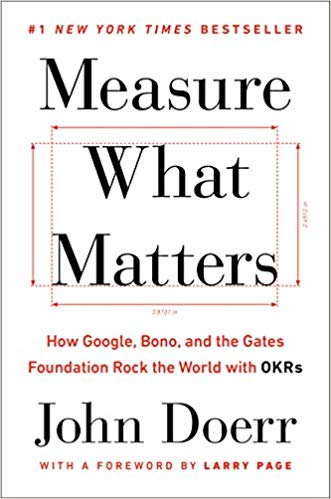 Remember those employee performance reviews that took place every quarter, half-year or year? Are you still doing them? Whether you’re on the giving end or the receiving end, it is/was a process you dreaded and that always left you feeling like you needed a good shower.
Remember those employee performance reviews that took place every quarter, half-year or year? Are you still doing them? Whether you’re on the giving end or the receiving end, it is/was a process you dreaded and that always left you feeling like you needed a good shower.
John Doerr, author of “Measure What Matters” says annual reviews consume 7.5 hours per employee and only 6 percent think it is worth the time it takes.
Statistics from the Society for Human Resource Management show 95 percent of employees are dissatisfied with their employer’s appraisal process, and 90 percent don't believe the process provides accurate information. Meanwhile, 65 percent of employees say it’s not relevant to their jobs and 66 percent say it interferes with productivity.
Thankfully, HR proponents have started to recognize that these are relics of the industrial revolution, when people were managed like machines.
Are you beginning to feel Albert Einstein was right when he observed “Not everything that can be counted counts, and not everything that counts can be counted.”?
If so, you are in good company: Adobe, Google, Intel, YouTube, The Gates Foundation and many others have completely scrapped the annual review for the far better process described in John Doerr’s book. The following will give you a feel for some of the changes, challenges and benefits of making the change.
It’s Time for Changes
We now realize performance reviews are ineffective at best and insulting at worst, and business coaches are advocating for new – and better – ways to manage workers. Some of the trends and goals today are:
- To provide ongoing changes in culture,
- Use shorter time horizons for setting key objectives and what must be done to accomplish them, a quarter at a time is the norm,
- Self-fulfillment through opportunities to learn,
- Work as a team on problems or activities,
- Decouple raises from accomplishment of goals to encourage stellar performance and end “sandbagging,”
- Get regular feedback from those in the group, and
- Receive regular frequent interaction and feedback from the coach/manager.
With these approaches, managers and employees don’t “do evaluations.” Instead they continually improve their capabilities, flexibility, resilience and contribution. Let’s look at the ways you can implement these in your company.
- Implement a Feedback “Loop”
Feedback remains critical for driving healthy interaction between managers and workers, but it doesn’t need to have the former heavy emphasis on financial rewards vs. punishments. Rather, having regular conversations focused on development gives you many opportunities to make small adjustments and keep a focus on goals.
Managers can link instant feedback to individual workers’ goals and can give on-the-spot recognition and small bonuses to those they “catch doing the right thing.” In the same context, employees should feel comfortable enough to provide informal feedback to (or about) their supervisors – a variation on the original 360-degree assessments.
- Review Goals More Often
In many companies, the goals made at the start of the business year are out of date by the end. [quotesright]Reviewing and setting new objectives quarterly is more practical for today’s business environment, and it shows. [/quotesright]
Studies indicate companies that set quarterly performance goals enjoy 31 percent higher returns than those who set goals annually, while those organizations that do so monthly get even more promising results.
- Motivate, Don’t Manage Staff
 The antiquated notion of managing people like we managed machines comes into play in this context. [quotesright]It’s important to create a fear-free atmosphere in your company, where people: [/quotesright]
The antiquated notion of managing people like we managed machines comes into play in this context. [quotesright]It’s important to create a fear-free atmosphere in your company, where people: [/quotesright]
- Have the space to be their best selves,
- Aren’t micromanaged,
- Don’t experience intimidation (physical or emotional),
- Understand expectations, and
- Receive support when they fall short of their goals.
With businesses globally facing the challenges of retaining their talented employees and increasing staff engagement, keeping workers happy while holding them accountable isn’t merely an impossible dream.
- Avoid Competitive Rankings
One of the drawbacks of the annual performance review process is that it pits one employee against another by ranking them according to the weightings in the reviews. Since these can be impacted by criteria such as areas for development, it means that a top-rated employee could effectively receive a lower ranking than a less effective but willing-to-learn employee.
[quotesright]Adobe Systems Inc. was one company that realized this. [/quotesright] They experienced a spike in the staff turnover among its most talented developers each year as good workers resigned directly after receiving “soul-crushing” reviews.
The company investigated and discovered it had recruited talented employees whom it considered exceptional, brought them into the organization, and then annually told them that compared with their peers they were only delivering average performances.
After completely throwing out that system and using one based on largely decoupling of salary from goals and letting the talent swing for the fences, retention soared and productivity took off.
- Provide Self-Fulfillment Opportunities
Most people intend to work until retirement age, and some even longer than that. [quotesright]Building a career to love and last in is an important factor in that plan. [/quotesright]Instead of highlighting what an employee does wrong or less-than-right during an assessment, empowered companies offer staff the chance to fulfill their own dreams by providing opportunities to learn.
They get to work as a team on problems or activities, receive regular feedback from others in the group, and obtain frequent interaction and feedback from the coach/manager.
Making a Fresh Start
So, if performance evaluations are dinosaurs, what should we replace them with? A modern appraisal approach is to change the company culture to one that is more collaborative:
- Hold a consistent number of private weekly and quarterly discussions with employees,
- Check in with staff to determine their morale and engagement, and
- De-link performance conversations from compensation conversations.
Develop a shared purpose to illustrate to employees why their work matters and have your management team focus on helping subordinates solve problems that affect the business, rather than linking to vague individual career goals.
What Happens to Productivity, Retention and Commitment?
The stories of the change in companies that adopt a new way of handling goals and appraisals attest to its power and effectiveness. Intel in 1979 was a memory module maker struggling to gain a foothold in the processor market with its 8086 against the easier to program Motorola 68000.
The quick summary of what happened is that in 6 months after changing to this new way of managing, Intel virtually owned the microprocessor marketplace and still does while Motorola makes cellphones and communications equipment.
 You’ll need to read John Doerr’s book “Measure What Matters” to discover all that happened Intel and at many other companies, large and small, but all were amazing stories of improvement. You’ll also go away with an understanding of this well thought out and proven way of managing your company.
You’ll need to read John Doerr’s book “Measure What Matters” to discover all that happened Intel and at many other companies, large and small, but all were amazing stories of improvement. You’ll also go away with an understanding of this well thought out and proven way of managing your company.
The Modern Approach to Performance
[quotesright]A big part of transitioning away from performance appraisals is the change in mindset from a process to a conversation. [/quotesright]
The modern approach takes the focus that any form of review is intended to help employees improve their career prospects and become a better version of themselves. This beats hands down the previous thinking that appraisals are necessary in order to complete the documentation needed by HR.
Combined with regular feedback from both their peers as well as interaction and feedback from the manager, workers can continually improve their capabilities, flexibility, resilience and contribution.
It takes courage to leave the path of least resistance, and there are many reasons why companies prefer to continue doing what they’ve “always” done. Realistically, however, the business environment changes almost daily and if you don’t keep up, you’ll be left behind, and go the same way as the rest of the dinosaurs did.
We are here to help you understand how to make this transition and have the training and consulting needed to make the changes you need in leadership, motivation and management. USA: 877.433.6225 USA: 877.433.6225 Email Me feedback@focalpointcoaching.com
Resources:
“Measure What Matters” by John Doerr
https://slate.com/business/2016/01/kill-the-annual-performance-review.html
https://www.shrm.org/hr-today/news/hr-magazine/Pages/0415-qualitative-performance-reviews.aspx
https://hbr.org/2016/10/the-performance-management-revolution
https://www.asuresoftware.com/global/blog/should-you-get-rid-of-annual-performance-reviews/
https://www.zenefits.com/blog/performance-management-outdated/














